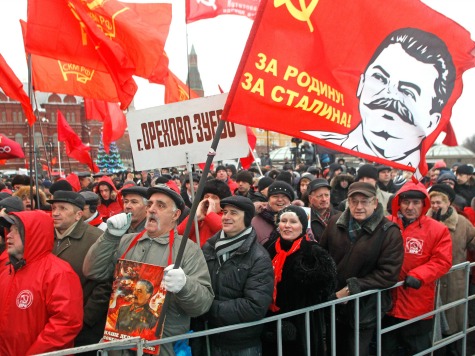
Russian President Vladimir Putin claims he does not want to put back together the USSR, but the little things he does says otherwise.
Nikita Krushchev changed the city to Volgograd in 1961 to de-Stalinize the USSR. From the Associated Press:
But regional lawmakers decided last year to use the historic name in some city statements related to the war, angering many in Russia, where Stalin’s name and legacy continues to cause fiery disputes.
Putin made the statement Friday during a meeting with Russian war veterans in Normandy, France, where he attended D-Day commemorations.
Responding to a veteran’s suggestion to restore the name of Stalingrad, Putin said it could be decided by a public vote.
This is not a surprise, though. In January 2013, the Volgograd city council said that for six days in a year the city will be known as Stalingrad. One of the days is February 2, which was the last day of the historic and bloody Battle of Stalingrad. This battle is the reason why the city is so important to Russia. The Russians fought the Nazis from August 23, 1942 to February 2, 1943 at Stalingrad and was the turning point on the Eastern Front. The German 6th Army was destroyed and the Axis started to retreat from the East. A total of 1.7-2 million on both sides, including civilians, were killed.
Yet, it could be renamed for other reasons. Putin said the fall of the USSR was the greatest geopolitical tragedy of the 20th century. He was a top KGB man in St. Petersburg before he moved to Moscow. During his first presidency and when he was prime minister, he bullied ex-Soviet states in order to dissuade them from forming closer ties to the West and Europe. In 2008, Russia and Georgia engaged in a war over South Ossetia and Abkhazia. It did not last long, but it is one of the reasons why Georgia wants to join NATO.
Former Georgian Prime Minister and representative to NATO Ambassador Grigol Mgaloblishvili told Breitbart News Russia wants to cripple much of Eastern Europe.
“The main objective of Russia is to regain its sphere of influence over the post-Soviet states,” he said. “After violating international law, after invading and occupying territories of European nations and violating the basic principles and consensuses of the post-Cold War order, Moscow has not paid any political price.”
His latest power grab is Ukraine. He bullied President Viktor Yanukovych to turn down a trade deal with the European Union for a $15 billion bailout and cheap gas. Russia cut the price of gas to $268.50. Yanukovych’s actions were met with a three-month protest in Kiev and he was ousted on February 22. In retaliation, Russia and Gazprom decided to use gas as a political tool and raised the price to $485 per 1,000 cubic meters. Gazprom also threatened to cut off gas if Ukraine does not pay off its debt and Putin made a few remarks that Europe’s supply could be in danger if they do not help Ukraine.
In mid-March, Putin annexed Crimea, a Black Sea peninsula, from Ukraine to “protect the ethnic Russians and Russian speakers” in the country. Pro-Russian forces erupted in east Ukraine after Crimea was annexed, but Putin claimed Russia was not involved. Donetsk and Luhansk held a referendum on May 11 and claimed independence from Kiev. On May 25, it was revealed Chechens from Russia were in Donetsk. These men told Courtney Weaver from Financial Times that Chechen leader Ramzan Kadyrov, who is very friendly with Putin, sent them. The new prime minister of Donetsk People’s Republic is Alexander Borodai, a Russian citizen from Moscow.
Due to Russia’s actions, other countries believe they might be Putin’s next target. A Russian diplomat told the United Nations Human Rights Council that Moscow is concerned about the treatment of Russian speakers in Estonia. Russia’s ambassador to Latvia told a radio station Russia will grant citizenship to ethnic Russians in the country.
Moscow implemented a new law that accelerates the citizenship process for any ethnic Russian or Russian speakers from another country. They also passed a law that allows them to intervene in a country they feel are mistreating any ethnic Russians or Russian speakers.

COMMENTS
Please let us know if you're having issues with commenting.